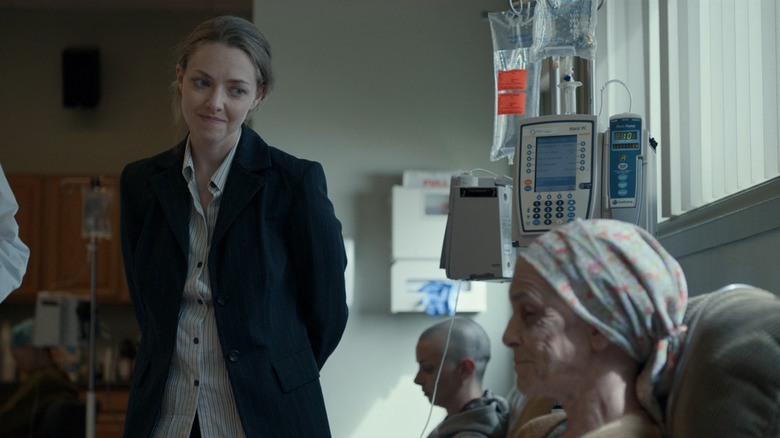In The Dropout, One Episode Stands Above The Rest
The question of whether or not Theranos founder Elizabeth Holmes was driven by blind greed and naked ambition, or a genuine (if delusional) belief in her own lie is at the heart of the public and media's ongoing interest in the Silicon Valley scandal. Of course, the fact that no one but Holmes can answer that question hasn't stopped a litany of outlets, writers, and creators from attempting the task. Indeed, Holmes' story has been turned into everything from an ABC podcast to a Hulu television series. An upcoming film adaptation from Adam McKay and Jennifer Lawrence is also in the works (via Variety).
Since so much of the interest in Holmes' story is driven not by the crime itself or its victims, but by our need to understand "why," it can be easy to forget that there were a variety of victims. Despite what various depictions might suggest, these victims were not just rich men in suits whose pride and pocketbooks took a hit, but also people whose health was affected by faulty Theranos technology. For instance, inaccurate Theranos test results led breast cancer survivor Sheri Ackert to believe she'd developed a rare tumor after undergoing both a double mastectomy and a year of chemotherapy (via Wall Street Journal).
One episode of "The Dropout" zeroes in on one of the most troubling aspects of the Theranos scandal.
Episode 3 of The Dropout is an important step for the series
In Episode 3 ("Green Juice"), Elizabeth Holmes (Amanda Seyfried) and lead lab engineer Edmond Ku (James Hiroyuki Liao) head to Nashville to test their faulty technology on actual cancer patients. Ku struggles to bring himself to perform the test, particularly after the patient (Susan Moore Harmon) expresses gratitude for their development of the technology. By contrast, Holmes appears both pleased with herself, and wholly content not just with her own lie, but with the fact that it is a lie. "These people know that they're participating in a trial," she tells Ku, before forcing him to go back into the building and perform the test.
For arguably the first time in the Hulu series, Holmes' actions come across as villainous — not just illegal, not just unethical, and not just (on some level) understandable, but wholly deceptive, uncaring, and dangerous. It's an important step for the series to take, and yet, part of what makes Episode 3 stand out is that it nonetheless refuses to give in to the temptation of portraying Holmes as some sort of evil, mad scientist Bond villain.
Later on, we see Holmes deepening her voice, practicing her characteristic affectation. "This is an inspiring step forward," she repeats aloud to herself in the mirror, and it's clear she wants people to believe it. What's left unclear is whether or not Holmes is simply rehearsing, or trying to convince herself of something she's not quite sure she even believes. While the former could make her a sociopath, the latter makes her a victim of her own delusional thinking.
Green Juice refuses to reduce its character to caricature
Episode 3 also continues to vacillate in its depiction of Elizabeth Holmes in her scene with the board of Theranos — a group of condescending, older white men who've just removed her from her own company. In the scene, director Michael Showalter guides the camera to follow the narrative's ambivalent portrayal of Holmes, alternately presenting the board as massive and intimidating, and Holmes (when she's the only person in the shot) as the one who is actually in control.
When Holmes convinces the board to let her stay on by bending the truth about finding a new CEO, the viewer is torn. On the one hand, it's tempting to champion a young, female entrepreneur outwitting a room full of rich, seasoned investors. On the other, we've just seen that same skill used to intentionally deceive and potentially endanger a bevy of unknowing cancer patients.
This episode's refusal to label Holmes as either a villain or an Icarus-esque victim — combined with its foregrounding of her oft-ignored actual victims — makes it one of the series' most powerful. Since the ending of "The Dropout" ultimately suggests that, in reality, no single depiction of Holmes will ever be entirely accurate, it's also an important episode that goes a long way toward supporting the ultimate thesis of the series.


